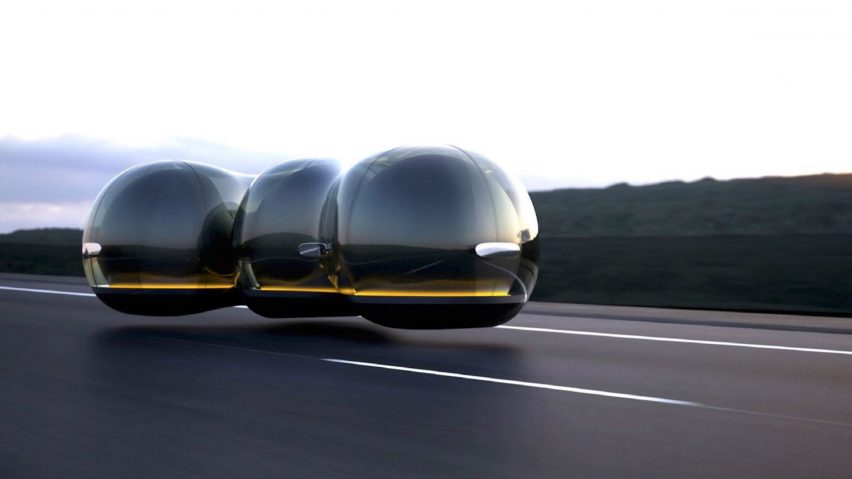A levitating bubble-shaped vehicle has been announced as the winner of a competition organised by Renault, which saw Central Saint Martins students come up with designs for a car of the future.
The French automotive brand partnered up with Central Saint Martins for the second year in a row to host the Life Designed competition, involving the school's MA industrial design students.
The results are currently on display as part of an installation at designjunction outside the university's Kings Cross campus. "This year students have been asked to consider ways in which cars may be used and shared in the future, when owning a car outright may become less prevalent," Renault said.
The competition encouraged the students to consider the future of autonomous and modular car design for an urban infrastructure that is "changing quickly and dramatically" – a trend that was much-discussed at the Frankfurt Motor Show last week.
Three semi-finalists were chosen at the beginning of September: Stephanie Chang Liu and her Flo design consisting of three vehicles fashioned for different uses, Tuna Yenici and his Vue vehicle designed to be like a pet, and Yuchen Cai for her Float concept car that uses magnetic levitation.
Cai's car of the future, The Float, was announced as the winning concept by Renault's vice president of exterior design Anthony Lo last night at designjunction.
With autonomy fast becoming a reality, Cai envisioned a car that also works as a social space – connecting people through "tessellation".
The pod-shaped vehicles – made for either one or two people – would slot in next to one another, attaching via a magnetic belt that encircles the exterior – allowing more than two people to travel together.
The pod's exteriors would be made from glass to offer travellers expansive views of their surroundings. Seats can be fully rotated, and the opacity of the glass can be altered to suit privacy needs.
The 23-year-old industrial design student from Shanghai also designed the car with sliding doors akin to those on London's underground tube trains. The doors open up to swivelling seats, making entering and leaving the pod as easy a transition as possible.
The cars will also be able to travel in any direction, with magnetic levitation (maglev) technology replacing the need for wheels.
Cai also incorporated a smartphone app into her winning design, which would function similarly car-sharing apps such as Uber and would allow users to rent a pod for a single journey or multiple days.
Runner-up Stephanie Chang Liu's concept also envisions a vehicle for social, shared transport. Her Flo design features three separate vehicles – one for the transportation of goods, one for personal transport, and one for shared transport – to ensure a "constant flow of goods and people across a city".
Tuna Yenici's Vue concept envisions an "emotional bond" between passengers and their cars, inspired by the relationship between humans and their pets. The imagined vehicle would greet the owner when first entering the car, and "will be sad to see the owner go" at the end of the journey.
A temporary two-storey structure has been built to house the Life Designed installation in Granary Square, showcasing Cai's winning design alongside a scale model of Renault's concept car TreZor, shown in the UK for the first time.
TreZor, first seen at last year’s Paris Motor Show, is Renault's electric coupé concept car with autonomous driving capacities. The two-seater vehicle is entered by a sliding roof instead of doors, which opens up to a red leather interior.
The Life Designed installation will be open to the public in King's Cross from 21-24 September during London Design Festival.

